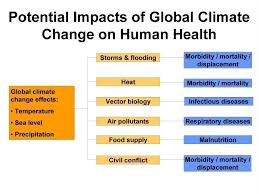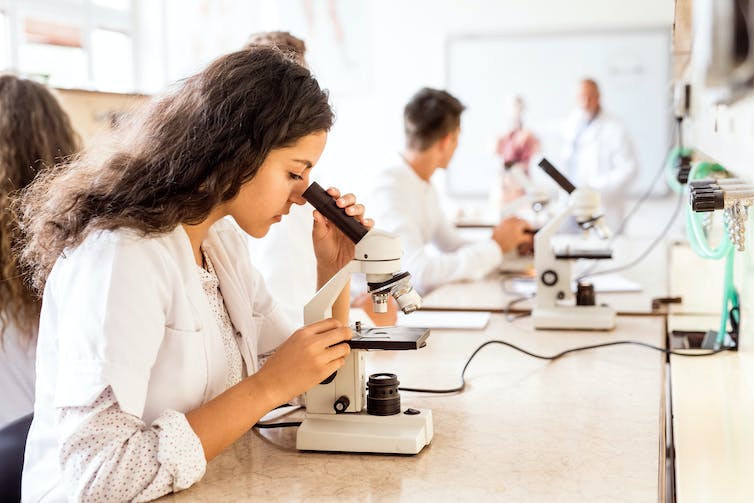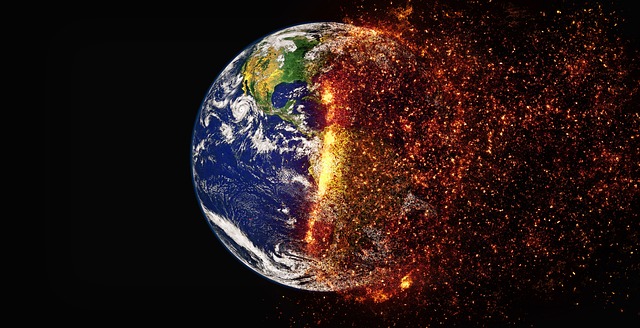
Understanding how the government addresses climate change is essential in order to combat it. The United States is a leading nation, and the actions taken by the federal government can help to accelerate global action. Implementing this approach at home is not easy.
The federal government has implemented several policies in order to curb emissions from all sectors of our economy to combat climate changing. This includes the Clean Air Act that requires the Environmental Protection Agency and states to collaborate to reduce greenhouse gas emissions. Other laws require the Department of Energy, in addition to setting energy efficiency standards, to partner with private firms to develop clean-energy technologies.

Additionally, the Biden administration has adopted a "whole-of-government" approach to combating climate change, which includes a partnership with state and local governments. It is also working towards reducing emissions from all the major sectors, including electricity generation and transportation.
Many towns and cities around the country are taking part in this initiative. Some cities have already taken steps to reduce carbon emissions. Others are focusing their efforts on adaptation projects such as improving water storage and developing heat-resistant pavements. Communities have the ability to plan for higher temperatures and help prevent disasters such floods.
Many countries around the globe are working together to fight climate change. The European Union, Japan, and South Korea have all announced new targets to reduce their carbon emissions. While most countries are determined to achieve net-zero emission by 2050, some countries are increasing their ambition.
A large proportion of the world's people are extremely vulnerable to climate change. People from the Pacific Islands are experiencing higher temperatures and sea-level rise. Indigenous Peoples are at the forefront of fighting against the fossil fuel industries. Many of these communities also play a key role in the fight against deforestation. Climate change is a critical issue. It affects all areas of the world.

Climate change poses a threat to both public health and the environment. It can also pose a threat for the economy. In addition, it can lead to conflicts between nations over water supplies. The United States must act now if it wants to prevent global warming exceeding two degrees Celsius.
President Joe Biden has led the effort to reestablish the United States' leadership in combating climate change. An executive order issued by the President earlier this year called on the Administration to reduce its domestic greenhouse gas emission by 50-52%, compared with 2005 levels, by 2030. He also encouraged Congress members to address the climate crisis. The President has appointed ex-governors to his Cabinet and has enlisted the entire federal government in his efforts to address the climate crisis.
Despite the obstacles in implementing policies domestically, the government is making significant progress. The Biden administration is making major investments in clean technology and has committed to reaching half of the country’s greenhouse gas reduction goal by the year's end. The administration has also entered into a partnership both with the private and public sector as well as local and state governments.
FAQ
What does the role of greenhouse gases contribute to climate change?
Climate change is driven by greenhouse gases. They act like an invisible blanket around the Earth, trapping infrared radiation and warming the atmosphere. Without them, our planet would be much cooler than it is now.
Human activity is responsible for the emission of greenhouse gases. This includes burning fossil fuels and other industries. As more heat enters the atmosphere from these activities, it leads to increased temperatures and extreme weather.
The most abundant greenhouse gas is carbon dioxide (CO2), which is released when burning fossil fuels such as coal, oil, and gas. Climate change is also caused by major greenhouse gases like methane (CH4) and nitrous oxides (N2O).
Human activities have caused a significant increase in greenhouse gas concentrations since preindustrial times. Global warming has resulted in an increase of temperatures around the world and in our oceans. It is also causing drastic changes, such as increased storms, droughts, melting glaciers and rising ocean levels.
Humans must reduce greenhouse gas emissions to avoid further climate change damage. This can be done by switching from fossil fuels to renewable energy sources such as solar and wind power. You can also reduce greenhouse gas emissions by reforestation and adopting farming methods that allow soil to absorb more carbon dioxide from the atmosphere. These activities will help lower atmospheric concentrations of greenhouse gases and create a healthier environment for all life on Earth.
What is the role that individuals and groups can play in addressing climate-change?
Climate change is one our greatest contemporary challenges. It is an issue that affects everyone and requires our collective attention, as well as individual action, for us to make a difference.
Individuals play a vital role in addressing climate change and reducing its impacts. Everyday behaviors can include anything from reducing waste and consuming consciously, going through changes in lifestyle such as switching to a vegetarian diet, consuming less meat, using public transportation more often, and choosing more sustainable materials in clothing and home decor. They can also be involved in political advocacy, and encourage initiatives within their communities that foster sustainability.
The key to addressing climate change at a larger scale is also the role of communities. They can help reduce carbon emissions by promoting sustainable energy sources, improving infrastructure for electric vehicles and cycling, and encouraging waste management through composting. This mission requires collaboration between communities in different cities and countries.
Furthermore, it is important to start education in the early stages and continue learning throughout your life. This will enable individuals to become more aware of the issues and better understand how we are connected with other societies that are similarly affected by global warming.
Employers ultimately have a major role in fighting climate change. Implementing corporate practices that focus on sustainability and opting to use green alternatives whenever possible will yield both sociologically and economically positive results.
The collective efforts of individuals, communities and businesses will all play a significant role in addressing global warming and defending humanity from the long-term effects of climate change.
What are the impacts of climate change on biodiversity, ecosystems and species?
Climate change has many effects on biodiversity and ecosystems. The most pressing issues facing wildlife and ecosystems are rising temperatures, extreme weather events, sea level rise, and increased acidity.
These shifts in climate conditions can cause shifts in habitat areas, disrupt food chains or affect population numbers or species distributions, with potentially dramatic consequences for biodiversity and the functioning of ecosystems. Changes in the hydrological cycle can also affect water availability for aquatic species.
Climate changes can lead to higher temperatures and more frequent extremes (such as droughts) which put more stress on already fragile systems, like coral reefs or tropical forests. The climate change will lead to the extermination or decline of as many as 30% of animal species in 2050. This could cause further destruction of ecological communities.
Climate change is therefore a considerable threat not only to biodiversity but also to human societies that depend on functioning ecosystems for food, fresh water, timber, and other services. To mitigate its effect efforts must be made at all levels to reduce global warming trends and future damages should be avoided where possible with careful management practices.
How do developing countries and communities experience the effects of climate change?
Developing countries and communities are particularly vulnerable to the effects of climate change due to limited access to resources, healthcare systems, and technology. Changes in temperature and precipitation can put more pressure on already limited resources. This is accompanied by flooding and droughts that weaken already fragile ecosystems. Rising temperatures can lead to a decrease in crop yields, which will disproportionately affect poorer communities struggling with food insecurity. Extreme weather events like hurricanes or heatwaves can also cause destruction to infrastructure, causing further economic inequality.
The long-term implications of climate change include continued resource scarcity, poverty, and health impacts including an increased number of vector-borne diseases such as malaria or dengue fever. In addition, there will be a higher risk of flooding due to rising sea levels coupled with extreme weather events putting lives at risk in coastal areas where populations often lack the adequate infrastructure or emergency services needed for evacuation. Not only does it require reducing greenhouse gas emissions, but other measures like better management and access to medical facilities. This will help with the prevention of diseases like Malaria.
How does human activity affect climate change
Climate change is caused primarily by human activity. According to the Intergovernmental Panel on Climate Change. (IPCC), human activity is responsible for more that 70% of all global warming.
Burning Fossil Fuels: Burning fossil fuels such as coal, oil, and gas releases carbon dioxide into the atmosphere. This increases the already high levels of atmospheric CO2, which acts as a greenhouse gas by trapping heat from Earth's sun and increasing temperatures. This causes higher ocean levels, as Arctic ice melts. It also scrambles weather patterns across the globe, leading to dangerous storms, droughts, floods and other problems that can affect food production and human health.
Deforestation is the removal of trees that store atmospheric carbon dioxide in their trunks. This happens when they use it during photosynthesis. Reduced forest cover can also increase albedo, which is the amount of reflected sunlight coming back into space. This reduces solar heat absorption at the surface of the earth and promotes global warming. As well decreases local air quality with deforestation being linked permanently with respiratory issues.
Farming: Each year, between 14% and 18% global anthropogenic greenhouse gases are released by the animal agriculture industry. Animal waste releases large amounts of methane gas into the atmosphere due to its composition rich in methane bacteria Eating less or no animal products altogether can be an effective way to reduce your contribution towards global warming from this source alone., Agriculture itself also relies heavily on fertilizers which contain nitrous oxide released into our atmosphere directly harms humans creating smog from ground level ozone harming our respiratory system making polluted air hazardous for life.
In conclusion, although human activity has had a devastating impact on our environment for centuries, technological advancements have enabled us to focus our minds towards the future. Instead of relying on carbon-emitting heavy industry, we can use green innovation to create eco-friendly efforts that combat climate change effectively and ensure everyone's safety.
Statistics
- Fossil fuel production must decline by roughly 6 percent per year between 2020 and 2030. (un.org)
- features Earth's average surface temperature in 2022 tied with 2015 as the fifth warmest on record, according to an analysis by NASA. (climate.nasa.gov)
- This source accounts for about 10% of all the water that enters this highly productive farmland, including rivers and rain. (climate.nasa.gov)
- According to the 2014 report on Climate Change Impacts, Adaptation, and Vulnerability (page 8) from the United Nations Intergovernmental Panel on Climate Change, governments at various levels are also getting better at adaptation. (climate.nasa.gov)
- This source accounts for about 10% of all the water that enters this highly productive farmland, including rivers and rain. (climate.nasa.gov)
External Links
How To
How to make your home more efficient and fight climate change
Your home's energy efficiency is one of the most cost-effective ways to cut your carbon footprint, lower your utility bills, and improve your quality of life.
Make sure your home is well insulated and sealed. Check for drafts, ensure doors and windows are properly installed, and then seal any gaps or cracks with caulking.
Insulate walls, ceilings and floors for maximum energy efficiency. You should inspect your attic and other areas for leaks.
Lighting accounts for up to 18% of total household electricity usage so make sure you switch to LED light bulbs which use up to 80% less electricity than traditional incandescent ones! Additional money can be saved by installing motion sensors, timers, and turning off lights only when needed.
It is possible to reduce your energy costs by replacing an old boiler or furnace. Newer models are more efficient. Consider getting a programmable thermostat that allows you to set temperatures based on when people are home or away from the house.
Replace all windows with double-glazed replacements that provide greater insulation and prevent heat loss. Low-flow showerheads, which are low in water consumption, can be bought. They maintain an adequate pressure level and reduce water usage.
ENERGY STAR-rated appliances can be replaced with products that use 50% less electricity than non-certified models. Don't forget about small details such as unplugging electronic devices like phone chargers or TV boxes when not in use - this could save you a significant amount of energy over time!
These are just a few of the steps that can dramatically reduce your impact on climate change and lower monthly electricity bills, making it easier to live at home.